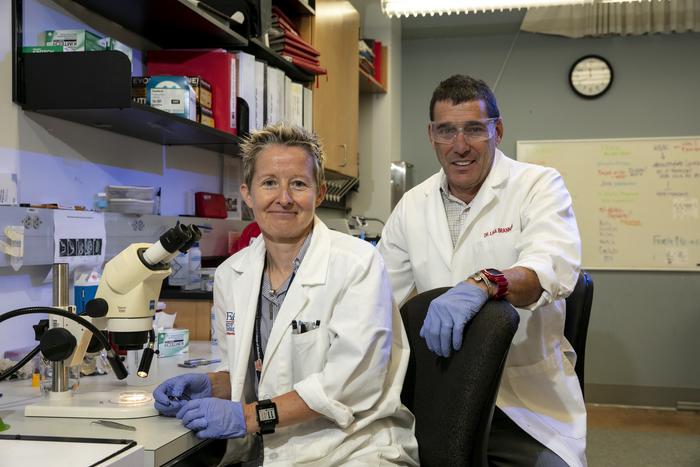
Researchers at Florida Atlantic University (FAU) have embarked on an innovative journey to confront degenerative diseases using regenerative medicine. Recently, they secured a significant grant of $1.9 million from the National Eye Institute of the National Institutes of Health (NIH). This five-year research initiative is set to explore the potential of engineered cell replacement therapies, particularly focusing on the eye’s lens, where cellular health is crucial for vision.
The cornerstone of this study revolves around replacing defective or damaged cells with new, functional counterparts. To achieve this, the research team plans to utilize embryonic stem cells that can be genetically programmed to transform into the necessary mature cell types. While there have been breakthroughs in cell reprogramming strategies, a critical challenge remains: the complete understanding of the specific needs and signaling pathways that facilitate mature cell formation.
The task is led by Marc Kantorow, Ph.D., who serves as the associate dean of graduate programs and a professor within the FAU Schmidt College of Medicine. Alongside him is Lisa A. Brennan, Ph.D., a research professor at the same institution. Their collective expertise aims to unravel the complex biological mechanisms that direct immature lens precursor cells towards their mature, transparent forms, which are essential for proper lens function and clarity.
The research team has previously identified a compelling factor contributing to their investigation: low oxygen levels, or hypoxia, play a significant role in conditioning these cellular transformations. Their prior studies provided clues suggesting that hypoxic conditions may drive the necessary cellular reprogramming events that lead to the differentiation of lens precursor cells into fully functional lens cells. This NIH grant will facilitate deeper examinations into the specific pathways through which hypoxia influences cellular transformation.
Kantorow’s research claims important implications for regenerative medicine. As articulated by Lewis S. Nelson, M.D., dean of the FAU Schmidt College of Medicine, this inquiry seeks to address fundamental challenges in the treatment of degenerative diseases. By identifying the precise requirements for converting stem cells into effective adult cells, the research could enhance therapeutic strategies and significantly improve patient outcomes.
To grasp these developments better, the research will focus on HIF1a, the master regulator of the hypoxic response. Understanding how this regulator influences lens gene expression and the role of oxygen-induced epigenetic modifications will be central to their investigation. This multilayered research endeavor will utilize lens cells as a model, shedding light on broader strategies for engineering complex cellular systems.
Current knowledge about the lens development has established that transforming immature cells into their mature forms, especially in the eye, is a coordinated process demanding specific gene activations. For instance, as epithelial cells transition into fiber cells within the lens, there is a need for these cells to express critical structural protein genes, like crystallins. If these processes are disrupted, individuals risk developing cataracts and other serious vision issues.
While existing literature indicates that signaling molecules, such as fibroblast growth factors, initiate cellular transitioning, the question of how genes pivotal to fiber cell maturation are regulated remains largely unanswered. This research initiative aims to fill that knowledge gap by investigating how hypoxic conditions facilitate gene activation through unique transcriptional and epigenetic modifications. Understanding these mechanisms holds promise not just for ocular health but for broader applications in regenerative therapies.
The work carried out in the Kantorow laboratory is anchored in a commitment to unraveling the molecular and mitochondrial dynamics that dictate ocular development and associated diseases. By employing advanced methods ranging from genetic analyses to sophisticated imaging techniques, the lab aims to understand crucial cellular processes better.
Importantly, this laboratory has established a comprehensive approach to examining how environmental stressors, including UV light, impact the eyes on a cellular level. Their research not only focuses on degenerative conditions but also on the preventive measures that could inhibit the onset of diseases such as age-related cataracts and other disorders of the retina.
The significance of this research stretches beyond academia. It poses transformative possibilities for individuals suffering from degenerative diseases. If successful, the findings could lead to innovative therapies aimed at restoring the function of damaged tissues, not only in the lens of the eye but potentially across various organ systems.
In their studies, the Kantorow team has revealed that factors like hypoxia induce crucial changes in chromatin, activating a cascade of cellular processes essential for differentiation and remodeling. This paradigm highlights not only the fundamental challenges faced in regenerative medicine but also the opportunities to design more sophisticated therapeutic interventions.
Over the last 18 years, the Kantorow laboratory has received sustained funding from the National Eye Institute and the NIH, revealing a persistent commitment to advancing our understanding of ocular biology. Their contributions emphasize the confluence of basic research and clinical applications, positioning them at the forefront of transformative health interventions.
In conclusion, the research undertaken at FAU represents a beacon of hope in the landscape of regenerative medicine, unveiling ambitious pathways toward healing degenerative diseases. By harnessing the power of stem cell technology and elucidating the biological underpinnings of cellular differentiation, the team could pave the way for novel strategies to combat age-related vision loss, fostering a future where regeneration is central to medical practice.
Subject of Research: Regenerative medicine and cellular reprogramming for treating degenerative diseases
Article Title: FAU Researchers Unravel Mechanisms for Regenerative Therapies: A $1.9 Million Grant from NIH
News Publication Date: [Date to be filled based on actual publication]
Web References: [References to relevant online articles, if available]
References: [Provide references for any citations]
Image Credits: Florida Atlantic University
Keywords: Regenerative medicine, stem cell research, degenerative diseases, cellular reprogramming, hypoxia, lens development, gene expression, ocular health, NIH funding, therapeutic interventions
Tags: challenges in cell reprogramming strategiesdegenerative disease research fundingembryonic stem cells researchengineered cell replacement therapieseye lens cellular healthFAU NIH grant for degenerative diseasesinnovative regenerative medicine treatmentsLisa A. Brennan scientific contributionsMarc Kantorow research initiativesmature cell formation signaling pathwaysNational Eye Institute funding supportvision restoration through cell therapy





